Disclosure: This article does not represent investment advice. The content and materials featured on this page are for educational purposes only.
Despite the high performance of Bitcoin and Ethereum, certain cryptocurrencies lagged, emerging as the crypto biggest losers of 2023.
The 2023 crypto market experienced a mix of highs and lows, with some coins emerging as cryptocurrency losers. Market data suggests that while most cryptocurrencies traded in green, notable exceptions ranked as the worst-performing crypto of the year.
For example, Bitcoin (BTC) and Ethereum (ETH) reached yearly highs in December 2023, showcasing resilience amid fluctuating conditions. This surge was partly fueled by expectations of a spot Bitcoin ETF, which could draw institutional investors and increase market confidence.

On the other hand, data highlights coins that suffered more than others, contributing to the category of crypto’s biggest losers. Regulatory and legal challenges, particularly those involving key crypto companies like Binance and Celsius, significantly undermined investor confidence.
Let’s delve into the top five losers in crypto of 2023. By analyzing the trajectories of these cryptocurrency losers, you can refine your strategies for the upcoming year.
Blur (BLUR)
In 2023, Blur (BLUR), an Ethereum-based cryptocurrency focused on the NFT space, experienced significant challenges. Starting with high hopes in the NFT market, BLUR faced a steep downturn, categorizing it as one of the biggest cryptocurrency losers of the year.
Despite some optimistic developments, such as a price increase following its listing on Binance and the completion of its Season 2 airdrop, BLUR’s performance for the year was disappointing.
Initially, the coin garnered attention for its novel features, like zero fees for NFT sales, but shifting trends in the NFT market soon led to a decline in its value. Hence, BLUR’s yearly drop of almost 90% makes it one of the worst-performing crypto assets of 2023.
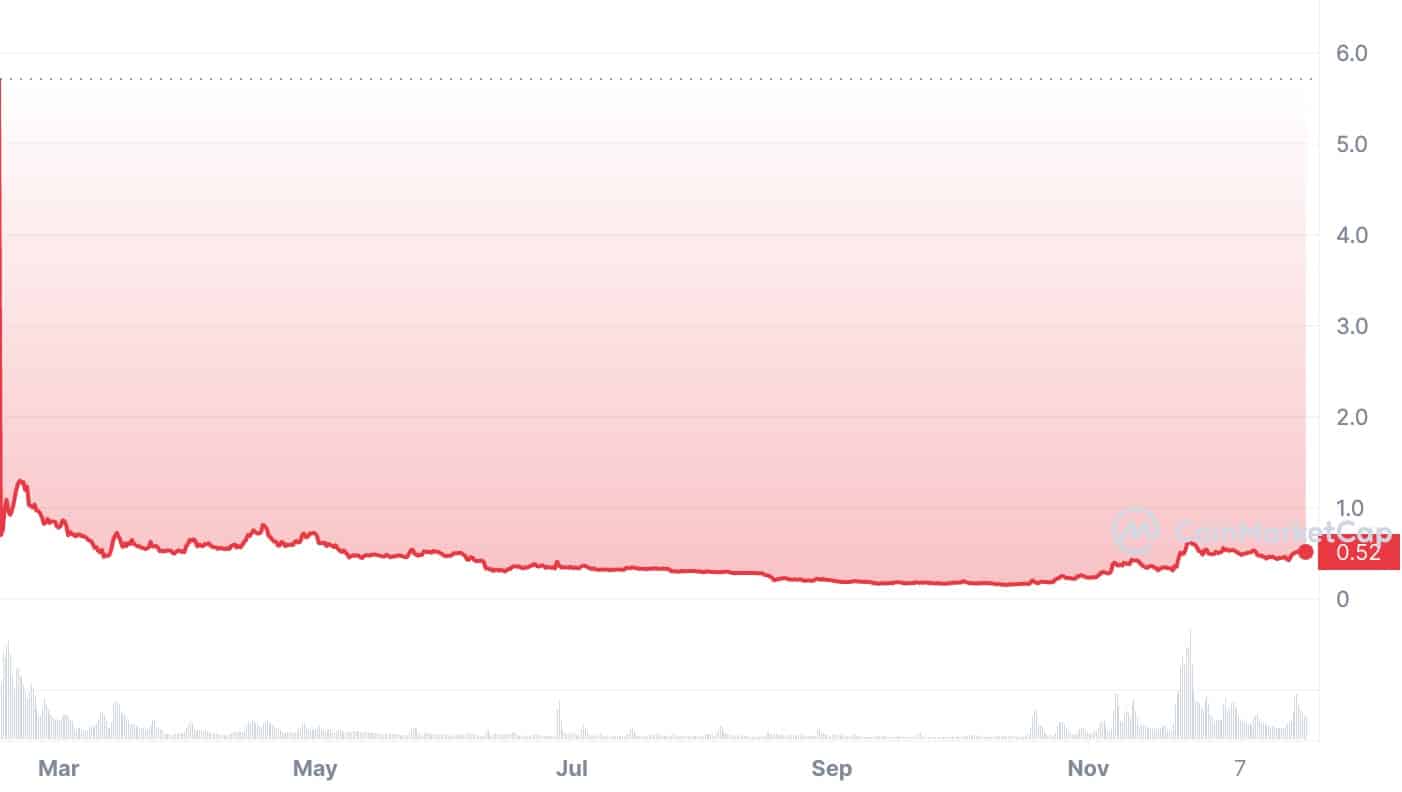
Sui (SUI)
Sui (SUI), a cryptocurrency on the Sui Network platform, experienced a significant downturn in 2023 despite its advanced technology and strong potential.
With its object-centric model, the Sui platform is designed for parallel transaction processing, sub-second finality, and diverse on-chain assets. Its native token, SUI, serves roles in gas payments and staking within a Delegated proof-of-stake framework. Sui’s approach to storage organization, focusing on “objects” rather than accounts, aims to facilitate efficient transaction processing and versatile asset ownership.
However, despite these technological strengths, SUI has faced challenges in holding its market position, leading to its classification among the worst-performing crypto assets and one of the year’s biggest crypto losers. The coin lost more than 84% in price during 2023.
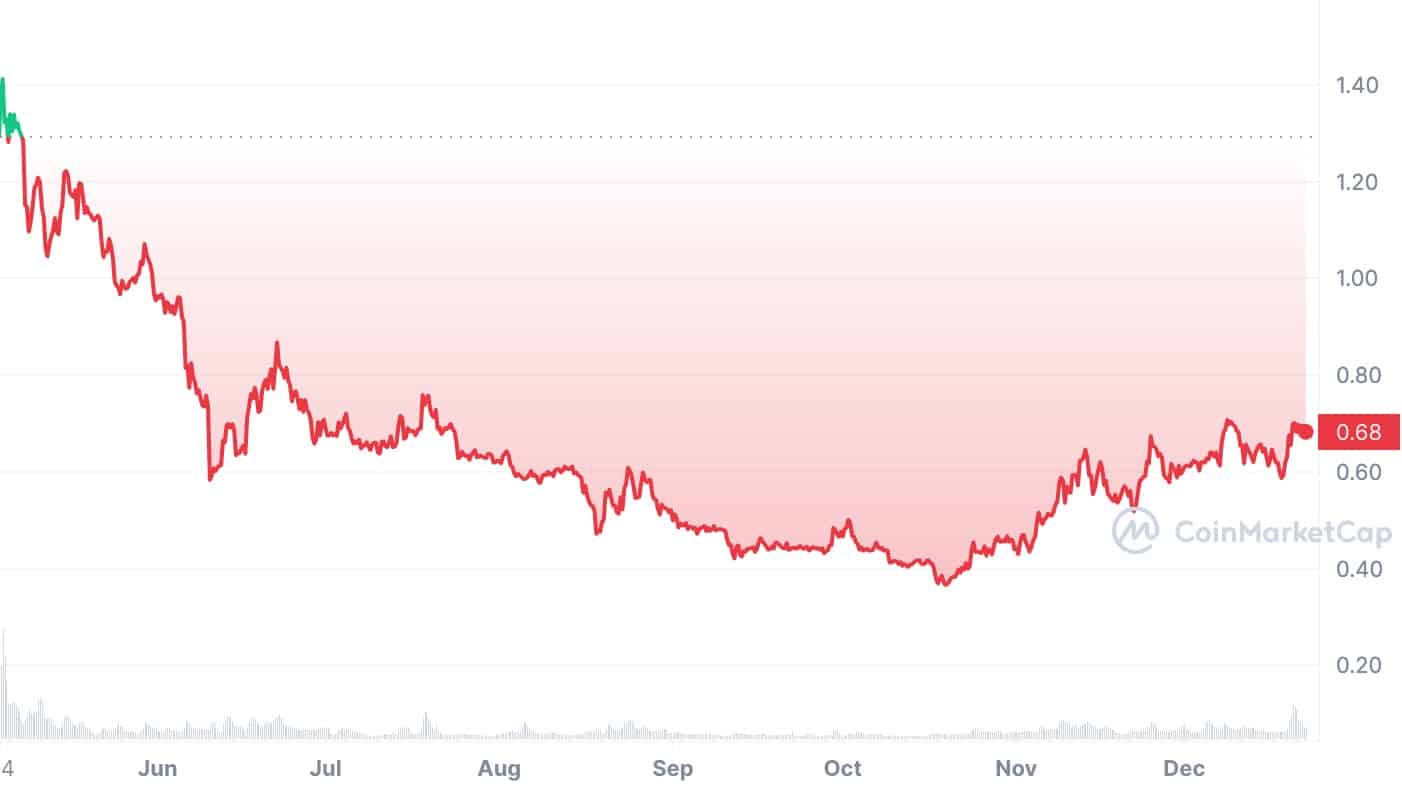
ApeCoin (APE)
ApeCoin (APE), linked to the well-known Bored Ape Yacht Club NFT collection, left investors questioning its future after a downturn in 2023.
Beginning 2023 on a high note, ApeCoin surged from $3 to $6.5 in the first week of January, only to lose momentum and fall to $1 by October. This yearly decrease of over 50% classifies ApeCoin as one of the crypto’s biggest losers of the year.
Despite initial excitement over its role in various ecosystem projects and its integration into the ApeCoin DAO, the token couldn’t sustain its value, ultimately landing it among the worst-performing crypto of the year.
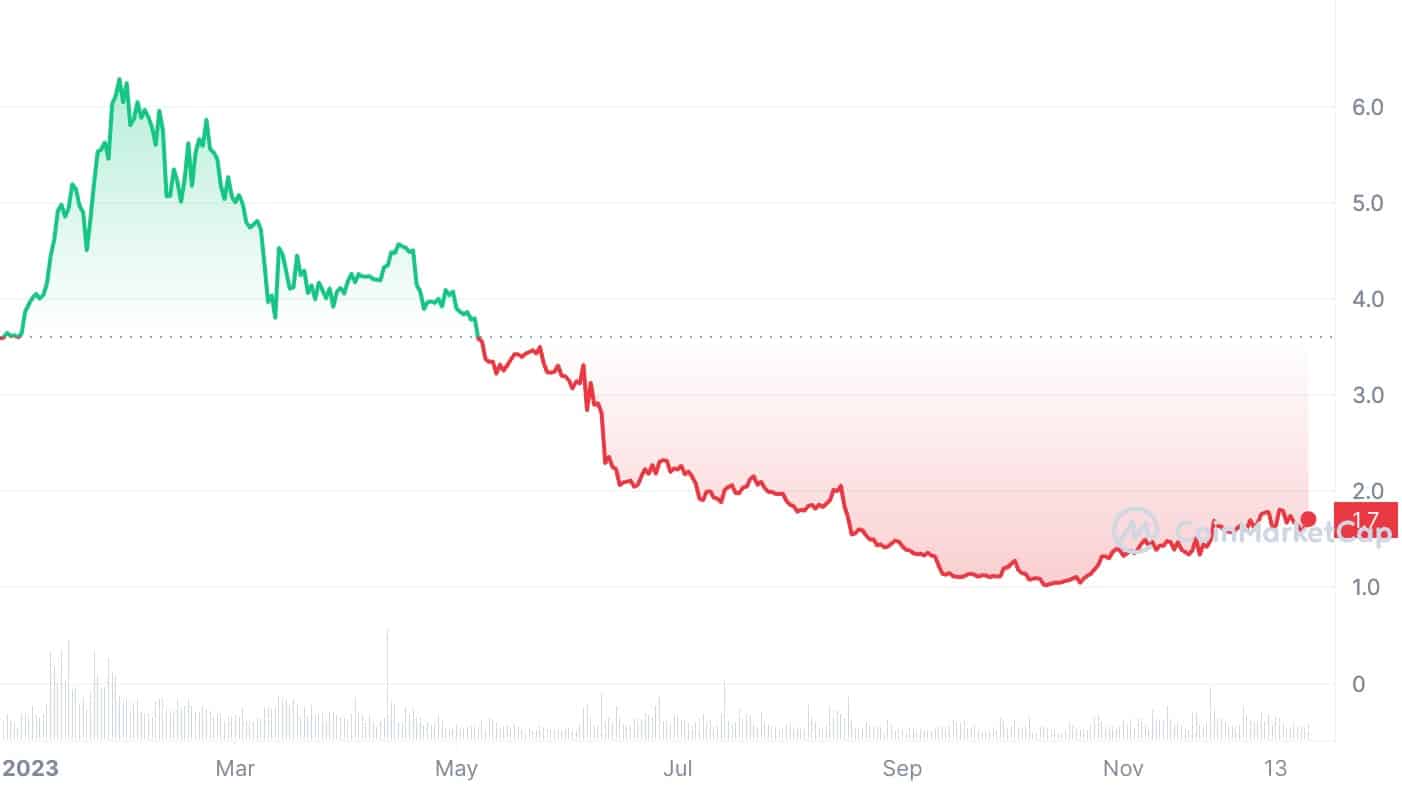
Terra (LUNA)
In 2023, Terra (LUNA) struggled with challenges following its dramatic crash in 2022.
That year’s drop, which wiped out most of Terra’s value, led to the introduction of Terra 2.0 as a replacement for the original Luna, now called Luna Classic. However, Terra 2.0 faced more problems, including legal troubles and market instability.
All of this resulted in a significant price loss of 20%, cementing its place as one of the biggest cryptocurrency losers of 2023.
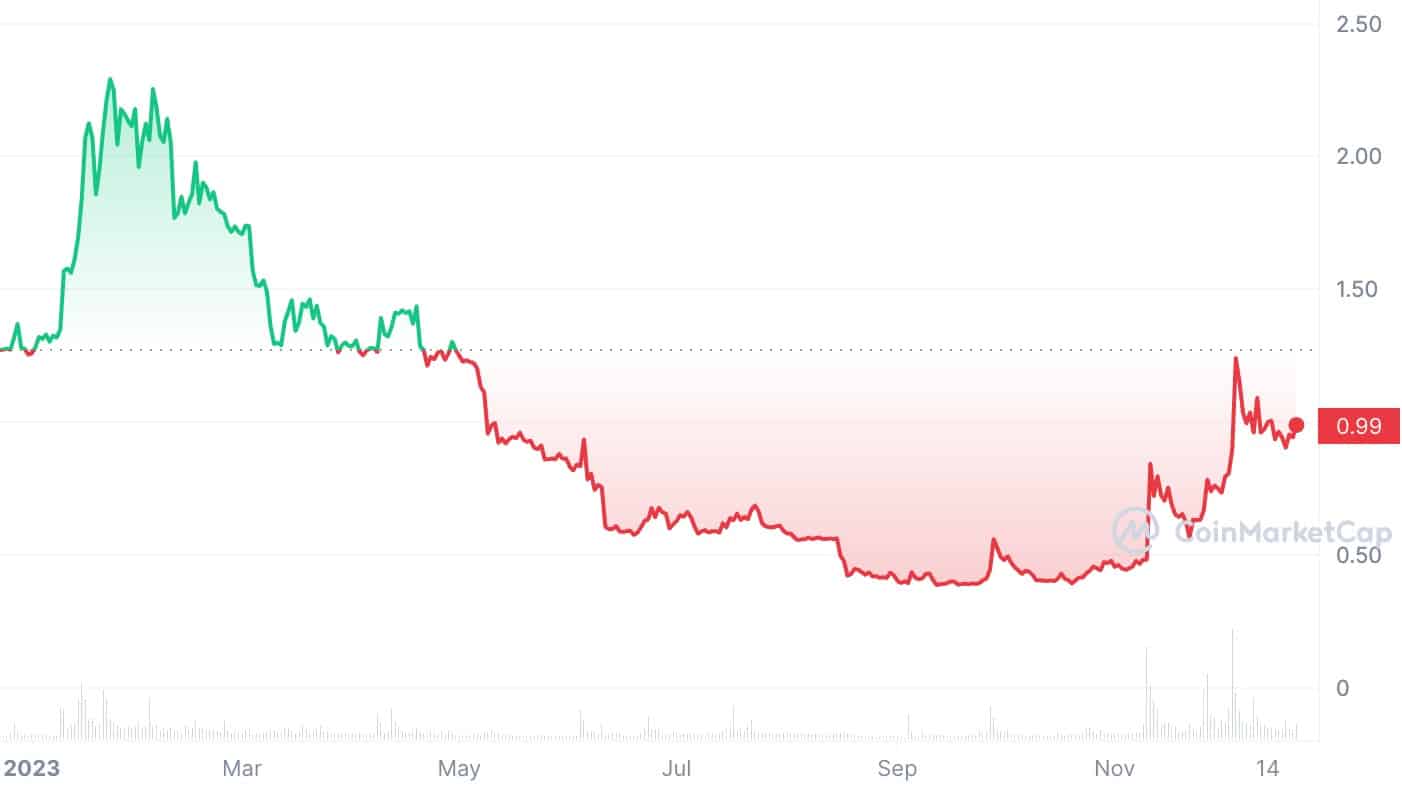
Zcash (ZEC)
Zcash (ZEC), known for its privacy-centric capabilities, faced a tough 2023.
Created in 2016 by Zooko Wilcox-O’Hearn, Zcash distinguished itself in the privacy coin sector through its scientifically supported technology, emphasizing decentralization and user privacy.
Zcash employs a zero-knowledge-proof method called zk-SNARK, which secures transaction privacy while upholding network integrity.
Nevertheless, even with these innovative features, Zcash has encountered challenges in the competitive crypto market.
After dipping to about $23 in June 2023 from an all-time high of $6,000 in 2016, it experienced a temporary rally where bulls drove the price up, yet it met resistance near the $30 level.
Despite indications of recovery from its earlier lows, Zcash’s price has struggled to consistently stay above the $31-32 range, categorizing it as one of the top five losers in crypto of 2023.
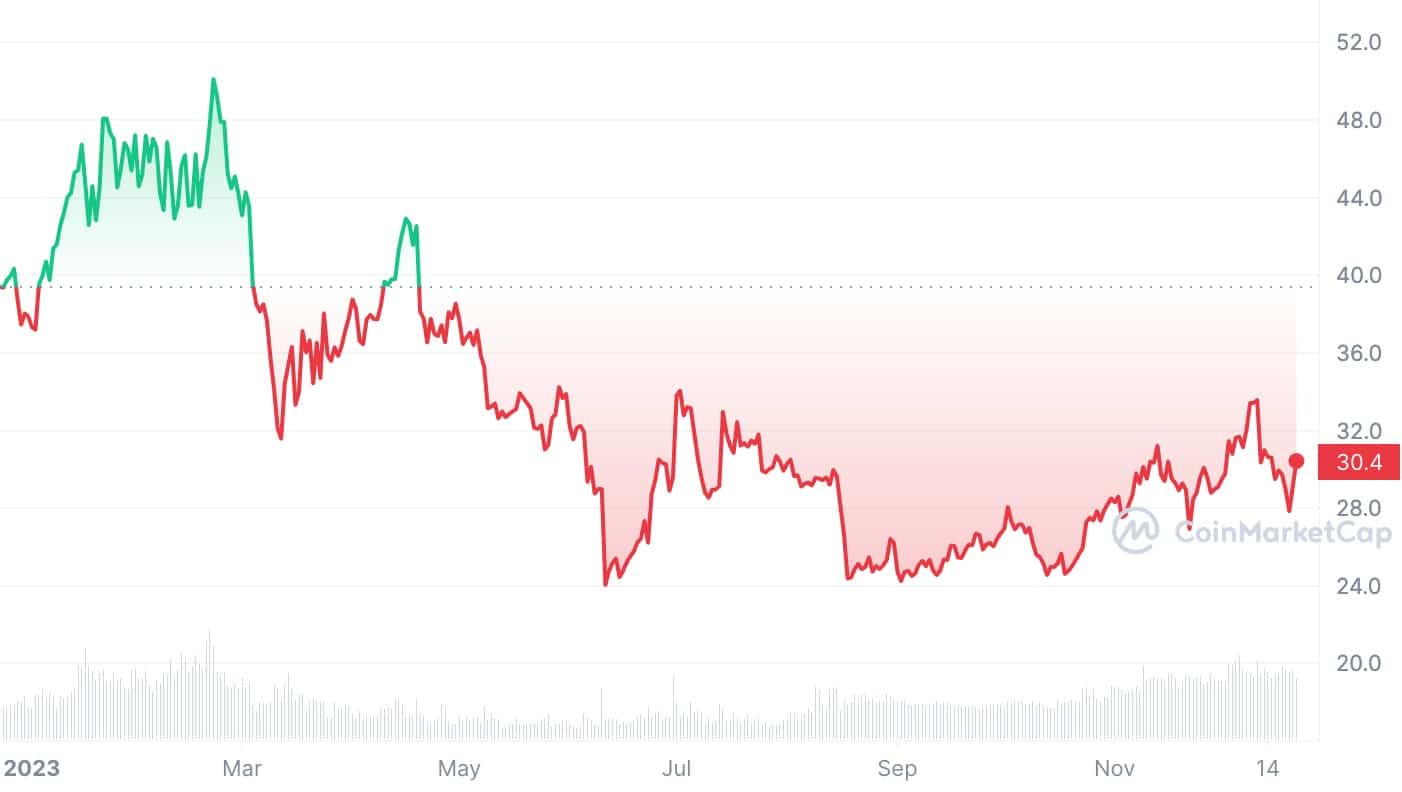
What to expect in 2024?
As we look toward 2024, the crypto market could be bracing for a period marked by significant developments and challenges.
A looming recession in the U.S. in 2024 is expected to test the resilience of the crypto sector. However, this could be counterbalanced by the anticipated introduction of spot Bitcoin ETFs, which could attract considerable investment inflows, potentially stabilizing Bitcoin prices despite the broader economic downturn.
Alongside these macroeconomic shifts, the crypto landscape is gearing up for the Bitcoin halving event in May 2024. Historically, this has been a bullish signal for the market, spurring interest and investment. However, there are no guarantees in the crypto market.
Moreover, regulatory clarity will be crucial in shaping the crypto market in 2024. Governments and financial authorities will likely establish clearer rules to enhance market legitimacy and stability.
However, this increased regulatory scrutiny might bring challenges, particularly for major exchanges and crypto companies.
Trade and invest wisely, and never forget the golden rule of investing: don’t invest more than you can afford to lose.
FAQs
Why did so many cryptocurrencies lose value in 2023?
In 2023, various factors contributed to the loss in value of many cryptocurrencies. Key among them were global economic uncertainties, which led to reduced risk appetite among investors. This scenario saw many shifting their investments from volatile assets like cryptocurrencies to more stable ones. Regulatory challenges also played a role. Moreover, technological issues, such as security breaches and scalability problems, further worsened the situation, leading to a decline in the value of many cryptocurrencies, including some of the worst-performing crypto assets.
What are the biggest crypto losers of all time?
The list of the biggest crypto losers of all time is extensive and changes every year due to the volatile nature of the market. Some notable examples include Terra (LUNA) and FTX (FTX), both facing catastrophic crashes. These cryptos, among others, were heavily impacted by factors ranging from internal management issues to market dynamics.
Read More: crypto.news








 Bitcoin
Bitcoin  Ethereum
Ethereum  Tether
Tether  XRP
XRP  Solana
Solana  Dogecoin
Dogecoin  USDC
USDC  Cardano
Cardano  Lido Staked Ether
Lido Staked Ether  TRON
TRON  Sui
Sui  Avalanche
Avalanche  Wrapped stETH
Wrapped stETH  Toncoin
Toncoin  Shiba Inu
Shiba Inu  Chainlink
Chainlink  Stellar
Stellar  Wrapped Bitcoin
Wrapped Bitcoin  Hedera
Hedera  Polkadot
Polkadot  WETH
WETH  Bitcoin Cash
Bitcoin Cash  LEO Token
LEO Token  Uniswap
Uniswap  Litecoin
Litecoin  Pepe
Pepe  Hyperliquid
Hyperliquid  Wrapped eETH
Wrapped eETH  NEAR Protocol
NEAR Protocol  USDS
USDS  Ethena USDe
Ethena USDe  Aptos
Aptos  Internet Computer
Internet Computer  Aave
Aave  Mantle
Mantle  Cronos
Cronos  POL (ex-MATIC)
POL (ex-MATIC)  Ethereum Classic
Ethereum Classic  MANTRA
MANTRA  Render
Render  Monero
Monero  Bittensor
Bittensor  Artificial Superintelligence Alliance
Artificial Superintelligence Alliance  Dai
Dai  Tokenize Xchange
Tokenize Xchange  Filecoin
Filecoin  Arbitrum
Arbitrum